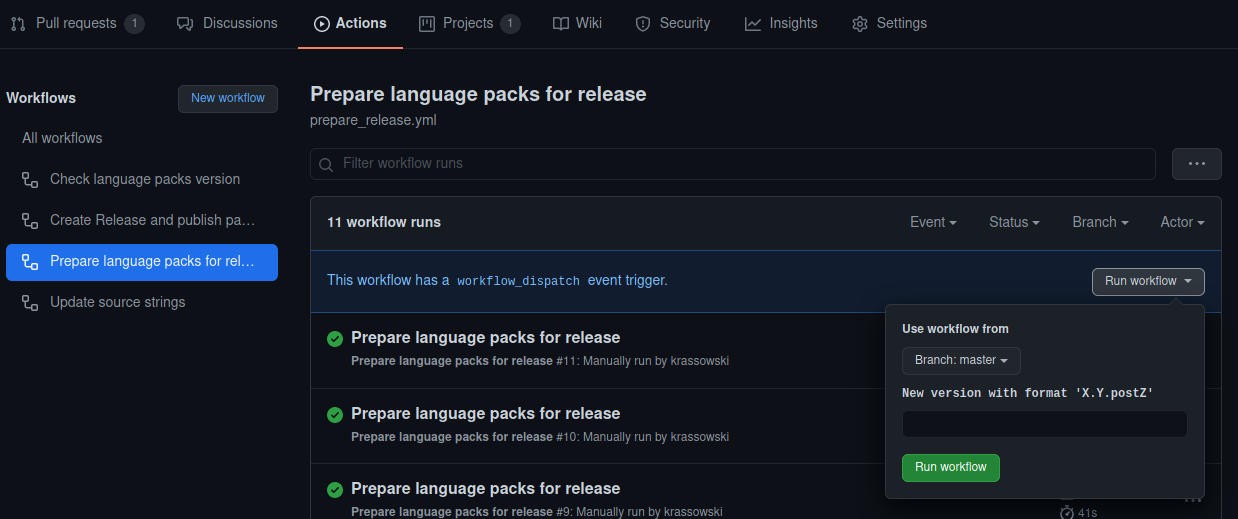Internationalization and Localization#
This section describes the various elements at play to create localized strings for JupyterLab.
Four elements are used to handle the internationalization of JupyterLab:
language-packs repository: It contains the source strings, their translations, the language packs and the GitHub workflows to update and publish the translations.
Crowdin project: Crowdin is the cloud-based solution that streamlines localization management for JupyterLab. This is the place where contributors can translate JupyterLab strings.
jupyterlab-translate repository: Python library defining helpers to deal with internationalization (e.g. extracting the strings).
Package template repository: It defines the Python package template of a language pack.
The language-packs repository is the main entry point. It interacts with Crowdin to publish
newer source strings and get the latest translation. It also creates and updates the language packs.
And finally it publishes them. All those actions are carried out using helpers defined in
jupyterlab-translate and the package template.
Workflows#
The workflows at play will be described next, in the order they are usually called.
Note
Automatic tasks are carried out through the jupyterlab-bot. To do that, that bot has access to the GitHub repository, the Crowdin project and all language packs projects on PyPI.
Source strings generation#
Source strings are extracted for JupyterLab and a list of extensions at a given version defined in repository-map.yaml file in language-packs repository. The workflow to trigger an update is as follow:
Edit
repository-map.yamlby adding new repositories and/or updating the target version.Push the change in a pull request.
Once the pull request is merged, the workflow Update source strings will automatically be triggered.
That workflow will open a new pull request that will update the source strings and optionally the Crowdin configuration.
Once that pull request is merged, Crowdin will upload the new source strings automatically.
If the placement of strings in the user interface changed (or new interface components were added) consider preparing new screenshots for Crowdin (see note below) and either upload them directly to Crowdin (filename should include the version number), or open an issue in the language-packs repository.
Note
Translating on Crowdin can be difficult when no sufficient context information is present, especially for Jupyter-specific terms. While some technically skilled translators will navigate to the codebase to check the context of a string, it is not an efficient workflow and prevents other translators from contributing. To enable more translators to contribute, and achieve higher accuracy of translations we should provide translators with annotated screenshots of the relevant usage of specific translatable strings (see Crowdin guide on screenshots).
Note
Crowdin is uploading automatically its source strings using GitHub Integration set up with the Crowdin account of jupyterlab-bot.
The script used for this workflow is 02_update_catalogs.py.
Translation update#
The new and/or updated translation are automatically pushed to the language-packs repository. The workflow is as follow:
A contributor updates the translation on JupyterLab Crowdin project
A new commit with those changes is pushed to the language-packs repository on a branch named
l10n_master.If there is no pull request associated with that branch, a new pull request will be opened.
A maintainer needs to merge that pull request.
Note
Crowdin is automatically uploading the translation using GitHub Integration set up with the Crowdin account of jupyterlab-bot. Hence the commits and pull request is attributed to the bot.
If the branch is deleted, it will be re-created.
Warning
To avoid merge conflicts on those translation update pull requests, they should be merged before
any repository-map.yaml pull requests as those will update the source strings. If not, the pull
requests updating the source strings need to be closed in order for the Crowdin integration to
re-open the PR.
Language packs update#
Before a release of updated language packs with new translations from Crowdin the language packs need to be prepared by updating the version strings of all packages. This is done by manually triggering the Prepare language packs for release workflow.
There is one optional setting:
The new version in form X.Y.postZ or a [hatch segment](https://hatch.pypa.io/latest/version/#supported-segments) - the default is rev that will bump the post number.

The workflow is:
Trigger the manual Prepare language packs for release workflow
That workflow will open a new pull request with the changes to the language packs
The validation workflow Check language packs version should pass on that pull request
A maintainer needs to merge the pull request
Note
The version policy for the language packs is to follow major and minor version numbers of JupyterLab and bumping the post number for any intermediate updates. The version of all language packs is identical to ease maintenance.
The script used for this workflow is 03_prepare_release.py.
Language packs publication#
Each time package version is modified the Create Release and publish packages will be automatically triggered. Its steps are:
Check that all language packs have identical versions
Start a matrix of job (one for each language pack)
Build the source and wheel artifacts
Create a GitHub release with tag <locale>@v<version>
Publish the artifacts to PyPI
Note
Publication is done using jupyterlab-bot credentials on all PyPI projects.
Conda recipe should be updated by the auto-tick bot of conda-forge.
Adding a new language pack#
This requires the following manual actions to be executed (in that order):
Add the language on Crowdin
Execute the Language packs update workflow
Manually upload the package on PyPI
Update the owner on PyPI to add jupyterlab-bot as maintainer
Acknowledge the grant for the bot
Update the github action list
Update the conda-forge variant list